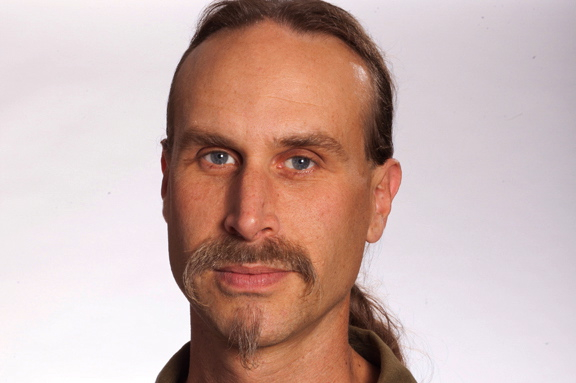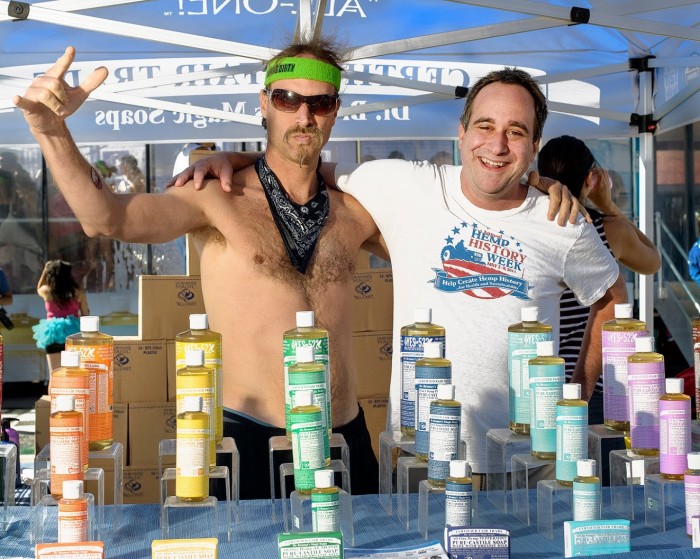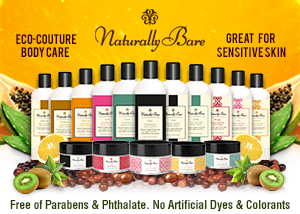8 Questions with Dr. Bronner’s President

In 1998, at the young age of 24, David Bronner took over as President of Dr. Bronner’s Magic Soaps, a natural soap-making company founded in 1948 by his grandfather Emanuel Bronner, a third-generation Jewish master soap maker from Germany. Today, David, now 41, runs the Vista, California-based company with his brother Michael and mother Trudy.
The Bronner family business mission is to “make socially environmentally responsible products of the highest quality and by dedicating profits to help make a better world.” With its unique, text-driven product labels, which include everything from socially conscious messages to cleaning tips, this top-selling organic bar and liquid soap brand has generated a devoted following in North America as well as in international markets, especially Korea, Japan, U.K., Australia, and Canada. Since David took over in 1998, the company has grown from $5 million in revenue to an anticipated $80 million in revenue for 2014.
Here, we check in with David Bronner to learn the secrets to this family-run company’s success.
—by Kathryn Matthews, founder of The Nourished Epicurean
GCM: What is the difference in the look, feel and experience of using a soap made with all natural ingredients versus a soap made with synthetic ingredients?
David: A properly made bar or liquid soap will give you an elegant hand or body wash. It lathers really smoothly. Our soaps incorporate the right proportion of coconut oil, which has a shorter, saturated fatty acid chain, resulting in a high lather, flash foam cleanser that works well with hot water. Our soaps also contain olive oil and hemp oil, natural emollients that contribute to a nice lather.
Unfortunately, the FDA does not regulate the term “soap” on liquid soap products, so most liquid “soaps” are not soaps; they’re synthetic detergent products. They will often feel slimy.
From a formula standpoint, the viscosity of our liquid soap is thin, but it’s actually two or three times more concentrated than your average commercial hand wash or body wash, which looks thick, but is much less concentrated; in other words, you have to use more of it.
GCM: People always associate fragrance with soaps. But fragranced soaps are often a source of phthalates. How do you navigate the fragrance issue?
David: The fragrance in our soaps is all natural. We use pure essential oils, like lavender, eucalyptus, tea tree, or peppermint, to scent our soaps. Our essential oils are 100% natural and most of them are organic as well.
GCM: How have you managed to grow and diversify the sustainability aspect of your business?
David: It’s been incredibly difficult, but also very rewarding. In 2003, we began using certified organic sources for most of our ingredients, but quickly realized that we didn’t know what the social conditions for farmers and workers were on the ground. So, we established Fair Trade practices because we wanted to have direct relationships with the growing communities from whom we were buying our ingredients. And, we wanted to ensure fair price, fair wages and fair working conditions.
For example, we established a Fair Trade coconut operation in Sri Lanka in 2007 that grew out of a tsunami relief project. Palm oil for our bar soap comes from Ghana, and it’s sustainable—no orangutan habitat has been destroyed. Our olive oil comes from small-scale farms in Israel, and we have a mint oil project in northwest India. Over 95% of our ingredients are local Fair Trade certified.
GCM: How do you build a global network like that for your ingredients?
David: The key has been finding the right allies who are very skilled at working with farmer projects in the developing world, partnering with them, bringing them on board and building our team. We work with a sister company called SerendiWorld that produces Fair Trade & Organic (FTO) raw materials in rural areas of Africa and Asia. We source only from small-scale farmers. Depending on the project, we may work with 500 to 3,000 farmers who have, on average, 10-acre farms. No plantations!
GCM: What advantages does Dr. Bronner’s have over soaps made by major consumer goods companies?
David: We’re in charge of our own production, right down to the farm. We have a more activist nature than most companies. For example, we’re very engaged in Vote Hemp, a national advocacy group dedicated to re-commercializing industrial hemp (not to be confused with reefer!). It’s the non-psychoactive varieties of the Cannabis plant, a sustainable crop that has many beneficial uses in the paper, textiles and automotive industries, among others. We use hemp oil in our soaps. So, we make investments that follow our ideals.
GCM: I understand that executive salaries are capped at Dr. Bronner’s. How does that work?
David: Yes, the total compensation of our highest-paid employees and executives, including me, is capped at five times that of the lowest-paid position. Our employees also receive 15% of their salary paid annually into a retirement/profit-sharing plan, and up to 25% of their salary as a bonus.
For example, my base salary is around $200,00. If we’re doing well, I can make up to $50,000 as a bonus (25%) for that year. We reinvest all profits into building our business and supporting the causes in which we believe.
GCM: What do you think are the major differences and similarities of how you have guided Dr. Bronner’s compared to your grandfather Emmanuel Bronner?
David: Like my grandfather, who believed that we are all children of the same divine source, I’m preoccupied with our “All-One!” unity across ethnic and religious divides. And, I’m committed to long-term social and environmental sustainability. However, where I go in a different direction than my grandfather in that my brother Michael and I are more focused on practical programs like agro-ecological and Fair Trade agriculture, youth and community programs, reforming drug policy to minimize overly punitive approaches to drug addiction, while integrating non-psychoactive cannabis, like industrialized hemp, into American and global culture—in a responsible fashion.
GCM: Any cleaning recipe tips that you can share with us?
David: Sure, the best resource is my sister Lisa’s blog: Going Green with a Bronner Mom.

David Bronner with his brother Michael at the Del Mar Mud Run, where a Dr. Bronner’s Magic Foam Experience was set up to help runners clean up after the race.


December 18th, 2014 at 7:32 pm
[…] Bronner’s Organic Liquid Soap, Peppermint & Hemp I’m a hard-core bar soap girl. But after interviewing the company’s President, David Bronner, and learning the lengths that Dr. Bronner’s goes to use certified organic sources for their […]